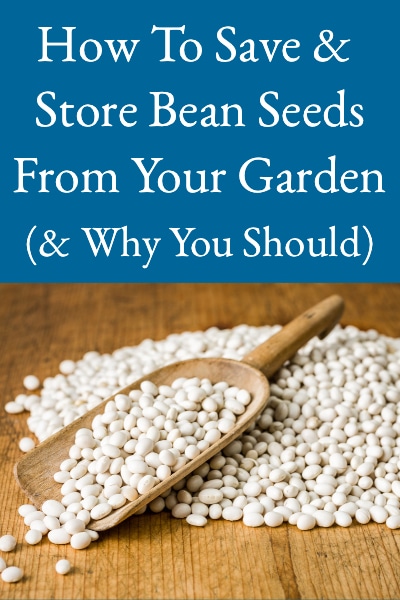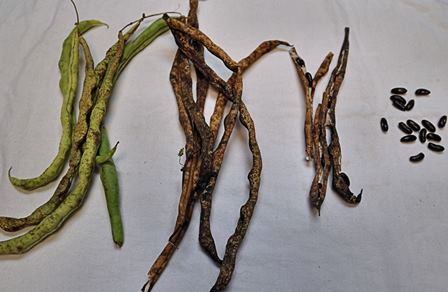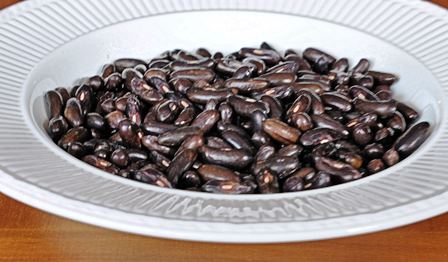Beans are one of the easiest seeds for a gardener to save, and this post on how to save and store bean seeds from your garden will give you all the details. 
Saving bean seeds really does have benefits over buying seeds each year. In order to save bean seeds (or any garden seed for that matter), you do have to grow an open-pollinated (often described as heirloom) rather than hybrid variety, but there are many good open-pollinated varieties of beans to choose from (see HERE for an explanation of heirloom vs. hybrid seeds).
BENEFITS OF SAVING BEAN SEEDS:
- Open pollinated varieties cost less initially than hybrid varieties
- If you save the seeds from an open pollinated variety each year, you never have to buy garden bean seeds again
- The seeds saved from bean plants grown in your garden will grow plants that are better adapted to your climatic conditions, and better able to resist pests and diseases in your garden. Each year the seeds become more adapted to your garden.
- It’s easy, and makes you feel so self-sufficient!
How To Grow Bean Seeds For Saving
If you’re going to save seeds, you want to make sure that the bean variety that you’re saving doesn’t cross with another bean variety, or the seeds won’t produce the same variety next year. Since beans are self-pollinating, crosses between different bean varieties are rare, but can occur due to honey bees and other insects. Where more desirable sources of pollen are abundantly available; however, bees are unlikely to bother with beans.
The easiest way to help prevent crossing, is to grow only one variety of bean in your garden. We happen to think that the green pole bean Fortex (see Great Homestead Green Bean) is a terrific bean that meets all of our needs, so we only grow that variety and don’t worry much about the possibility of crossing.
If you’re going to grow more than one variety of bean (or you have near neighbors that are growing other varieties), then you may want to consider caging for bush plants and blossom bags (see Isolation Techniques for Seed Saving) for taller varieties to prevent the possibility of cross-pollination. Cages and blossom bags can be constructed from spun polyester, but need to be in place when the first blossoms appear on the plants until the last are gone, and need to prevent insects from reaching the blossoms while also admitting sunshine and water.
Which Bean Seeds To Save
Seeds should be saved from the healthiest, most vigorous plants, and the beans pods can simply left on the plant to dry. The bean seeds are inside the bean pods, and once the dry pods are picked, can be split open and the seeds will fall out. Only whole, intact, unblemished seeds should be saved.

Bean Pod Drying Progression to Bean Seeds
How To Store Your Saved Beans
Home-saved bean seeds almost always include bean weevil eggs, and the larvae can destroy your seed crop while you’re not looking. To prevent this, the seeds should be stored in an airtight container and placed in the freezer for five days.
Once you remove them from the freezer, let them come to temperature overnight in the airtight container – this prevents condensation and the seeds taking on moisture. That’s it, you can now store the seeds somewhere that’s dry, dark and cool, and they should be viable for several years.

Saved Fortex Bean Seeds
Cori says
Thank so much for this.
I thought I remembered that beans were self-pollinating, like tomatoes, but wanted to make certain.
In addition to freezing for five days, I’ll also be adding about a teaspoon of diatomaceous earth, to prevent damage from any insects that might make their way into the storage bags.
Nearly all my seed is open pollinated, and it’s all non-GMO, so I’m good to go, and hoping to add a number of heirloom varieties in the next few weeks.
Lesa says
Hi Cori, Sounds like you’ve got your seed supplies in great shape – it’s a good feeling isn’t it!